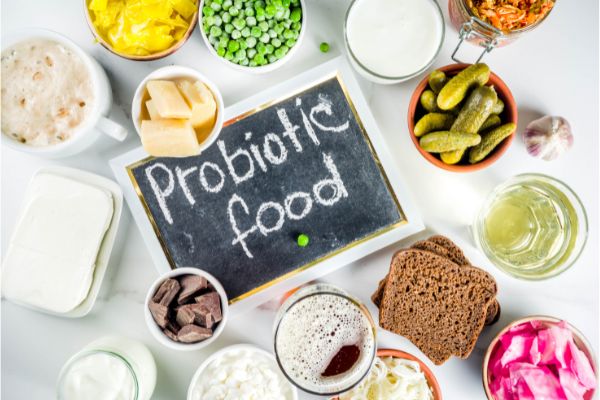In a world of hectic schedules and daily hustle, it is crucial to provide our bodies with beneficial stuff. To do this, it is vital to examine our diet regularly. Examining our diets includes finding whether our diet includes essential vitamins, minerals, prebiotics, probiotics, etc.
The first thought that comes to our mind when we think of bacteria is that they are destructive germs. We often forget that there are also beneficial bacteria on this earth. Probiotics are one type of beneficial microorganism with numerous health advantages. This article will discuss the most incredible probiotic foods in India, high in probiotics and beneficial to our overall health.
What are Probiotics?
According to the classic definition, the primary role of probiotics, or microflora, is to sustain healthy homeostasis in the body. Probiotics are live bacteria and yeasts that reside in our gastrointestinal system. Both beneficial and dangerous bacteria are always present in our bodies. When we acquire an ailment, our body produces extra harmful bacteria, which throws our system off balance. Awful bacteria are eliminated by good bacteria, restoring the equilibrium. Healthy bacterias are a method to motivate our diet with beneficial bacteria. The microbiome of each individual is unique. Individual microbial cells, including pairs, are distinct.
A bacterium must possess certain qualities to be classified as a probiotic. These include the ability to:
- Alienate yourself from humans.
- After consumption, persist in your gut (being eaten).
Working of Probiotics
Consider it like moving your body in a neutral position. When you become unhealthy, harmful bacteria infiltrate your body and multiply. This throws your body off-kilter. Certain strains of beneficial bacteria can also:
- Assist your body’s digestion.
- Prevent harmful bacteria from taking over and getting you sick.
- Make vitamin supplements.
- Medication breakdown and absorption.
Ways to Consume Probiotics
A probiotic supplement can be taken in a variety of ways. They can be located in a range of places, including:
- Foods.
- Drinks.
- Pills or capsules
- Powders.
- Liquids.
- Probiotic and prebiotic supplements can be mixed.
Indian Probiotics
Our country, too, has a wide range of probiotic delights that Americans enjoy daily. The South Asian community is primarily known for its probiotic-rich meals.
Probiotics are already present in several Indian savory dishes that are part of the regular diet and can be added to your diet. The majority of the probiotics that we will talk about will include foods we Indians consume daily. Our Indian ancestors were very particular about the food they consumed. Consuming good quality food helped them function all day, be active, and have a very productive life. Our generation’s main issue is that we do not monitor our food. This leads to us being unhealthy and not being able to manage our hectic life. Let’s see which probiotics we can consume which can easily be found in our homes.
Pickles
Most pickles require veggies to be hardened with oil or water, salt, and other spices for a few hours. Due to the wide variety of fruits, vegetables, spices, and condiments used to make pickles, they support the excellence of the components. They’re simple side dishes that bring a lot of flavor to any feast. Pickle is a must for almost every traditional Indian meal. Indian meals have these small side dishes, which provide flavor and health benefits to the person consuming them.
Yogurt
Yogurt is one of the top sites of probiotics.
Dairy products are linked to several health benefits, including enhanced bone health. It’s also beneficial for people who have high vital signs.
In children, dairy products may help reduce the side effects of antibiotics. It can even help with the indications of ulcerative colitis.
Furthermore, dairy products may be suitable for people who have genetic problems. This is because the bacteria convert some of the disaccharides into carboxylic acid, which is why dairy products taste bitter.
Kefir
Kefir is a cultured probiotic milk drink. This probiotic ingredient is prepared by fermentation. Cow or Goat milk using kefir grains is fermented together.
Kefir grains are not cereal grains, but lactic acid bacteria and yeast cultures resemble cauliflower.
Kefir has been associated with a multitude of health advantages. These advantages include the following points:
- Maintenance of osteo health (i.e., bone health)
- Resolving everyday digestive problems, and
- Keeping infectious invaders away from the body.
Tempeh
Tempeh is a high-protein meat replacement. Tempeh is a well-known soybean-derived food product that has to be fermented. It grows into a solid patty with a nutty, earthy, or mushroom-like flavor.
Tempeh has high levels of phytic acid. Fermentation keeps the phytic acid levels low in Tempeh. Reduced levels of this acid potentially raise the number of micronutrients absorbed from tempeh consumption. Vitamin B12 is quite an essential that our body requires every day. Fermentation helps in generating this vitamin B12 in Tempeh. Moreover, Tempeh has been considered a superior alternative for vegetarians.
Paneer
This food product is widely consumed, especially by Indians. Children’s favorite Paneer contains millions of benefits. With high protein content, Paneer is also a famous probiotic. Paneer can be consumed after cooking it as a gravy meal or without putting any effort into it and consuming it raw.
Buttermilk
Buttermilk is an alternative to curd if you may not like or prefer it. In summers, buttermilk is served with meals in Indian households. It tastes yummy, but it also provides a sense of cooling to the human body. Along with being a great summer drink, it provides health benefits because it is a great probiotic.
Benefits of Probiotic-Rich Indian Foods
Probiotics provide several advantages, including:
- Aids in the digestion of food
- Prevents harmful germs from turning renegade and causing harm to the host.
- Probiotics produce vitamins.
- Hinders the covering of the gut from becoming infected with dangerous bacteria that may have been absorbed by food and helps the lining cells in their efforts to prevent germs from entering the bloodstream.
- Reducing the high limits of cholesterol in the body.
- One of the most prevalent uses of probiotics is to treat diarrhea.
Prebiotics and Probiotics, What are their differences?
Probiotics are living bacteria that already exist in the gut and help it function properly. The prebiotic is the food that gives these microorganisms energy. They can be found in a variety of probiotic Indian dishes.
That means we can control the number of microbes and the amount of energy they receive through our food. Both are accessible as nutraceuticals if your nutritional needs aren’t being met.
The debate over which is superior will likely continue for some time, but new research has given additional illumination to the contributions they both play. Probiotics can help prevent unpleasant illnesses like Inflammatory Bowel Ailment and Ulcerative Colitis by fighting infections in the stomach. Prebiotics, on either hand, can aid in the prevention of salmonella and even bowel malignancy. And it only has lovely things to say about each of them.
Frequently Asked Questions
Question 1: In my body, where do helpful probiotics (microbes) reside?
Answer: Though your gut (mainly the large intestines) is the most prevalent home for helpful microorganisms, you have several other places in and on your body where they live. These are the locations:
Gut, Mouth, Vaginal, Urinary system, Skin, and Lungs.
Question 2: Can probiotics be used to treat various ailments?
Answer: There is a lot of research to see what probiotics can do for your health. Researchers are still attempting to establish definitive answers regarding how probiotics can aid with various illnesses, despite the many possible positive outcomes.
Question 3: Do probiotics aid weight loss?
Answer: Probiotics can help you lose belly fat since they lessen the symptoms of bloating. Lactobacillus and Bifidobacterium probiotics have been evidenced to suppress appetite and belly fat reduction. Lactobacillus gasseri sure sounds to be among the most tremendous productive.
Conclusion:
Probiotics have had an essential role in human evolution and function. Indian foods high in probiotics are widely available and relished across the country. It is pretty essential to consume as much quality food to keep us going all day at a young age. Maintaining a healthy lifestyle at a young age will help prevent terminal diseases at old age. Consume good food, avoid too much junk, study your food intake, and you’ll see the difference in your body and life yourself. Supplements are also recommended sometimes to alleviate the caloric void.







